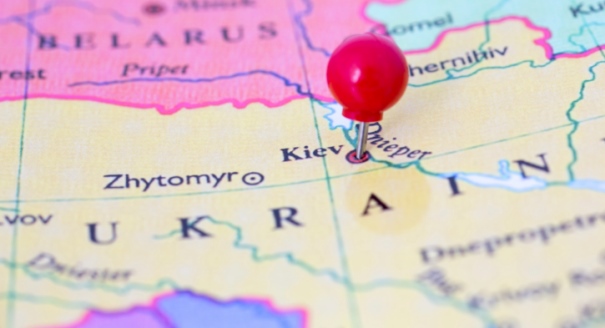An increasingly pressing question amid the turmoil in Ukraine is whether some form of devolved governance can suffice to stabilize the country. The independence referendums that took place on May 11 in two regions in Eastern Ukraine have made this debate both more urgent and more fraught. The issue will be central to the possible national dialogue that has been proposed on Ukraine’s future.
The line taken by the West and Kiev is that decentralization is much needed, while Russia touts federalization as a solution. Many in Ukraine and within Western governments fear that federalization would portend a dismantling of the state and paralysis of national-level decisionmaking.
The negative conclusion is that this decentralization-versus-federalization debate represents another impasse between different Ukrainian factions and between the West and Russia. A more positive hope is that there might be points of compromise or sufficient commonality between the two concepts to win assent from both sides of the conflict—even if most acknowledge this looks unlikely amid the current wave of separatist activism.
The dangers of federalization in Ukraine flow from the Russian tactics it might enable, rather than from the concept itself. The core principle of federalization is to accord subnational units constitutionally enshrined rights of shared sovereignty, not to guarantee a particular level of political influence over the central state. There are federations that are relatively centralized and others that are relatively decentralized.
Russia sees Ukraine’s federalization as a means of ensuring its “neutrality.” But federations leave foreign, security, and trade policy in the hands of the central government. Russian President Vladimir Putin’s vision of Ukraine’s Eastern regions being able to pursue their own foreign policy alliances would require the country to become a confederal, not a federal, state.
Moreover, whether Eastern and Southern regions could paralyze decisionmaking would depend on the precise powers given to the (territorially based) senate. Federations in fact exhibit a wide variety in such arrangements.
Moscow’s demand in Ukraine seems to be less for federalism per se than for power-sharing quotas. Comparisons with other federal systems do not bode well in this regard. The Bosnian model is not auspicious: the Dayton Accords did help quell violent, open conflict in the Western Balkan state, but they have also prevented the embedding of national-level institutions.
Assuaging Russian speakers in Ukraine’s East is not quite the same thing as advocating full-scale federalization of the whole state. The Scottish model is often referred to; but this gives special devolved governance arrangements to Scotland within a classical unitary state.
Polls suggest people in Russian-speaking areas are concerned about minority rights but do not seek an unraveling of the Ukrainian state. As Ukraine’s subnational units are all extremely heterogeneous, a Belgian model of linguistic duality would hardly be feasible in practice. Federalization is one thing, selective or asymmetric decentralization is another.
Of course, many doubt whether Moscow really has a coherent and genuine plan for an effective federal state or simply advocates this principle as a Trojan horse for destabilization. Good local politics would create more space for moderate pro-Ukraine citizens. Does autocratic Russia really want this kind of vibrant local democracy in Ukraine?
In short, precision is needed over what is actually being debated. The challenge of winning a strong majority in favor of deeper partnership with the EU is a function of the divide in overall popular opinion on Ukraine’s international orientation. Both sides of the debate should engage in fair and sustained deliberation rather than focusing on institutional designs engineered to produce a particular outcome. Limiting local influences in the name of producing a specific foreign policy orientation would be inimical to the democratic values that animated Ukraine’s popular revolution.
While political scientists have long struggled to draw a clear line between decentralization and federalization, one clear lesson emerges from transition experiences: either route to devolved governance must be accompanied by democracy building that transcends ethnic and linguistic divisions.
In this sense, there is now a more acute challenge. Many in Ukraine and the EU worry that recent tensions in the East and South now make rapid decentralization less advisable, because the unity of the state today seems too fragile to bear any such process.
Academic studies show that decentralization can enable reform spoilers to complicate democratic change. Decentralization has been on the agenda for many years in Ukraine and has invariably taken forms that embed corrupt patronage networks—a temptation to which the current interim government has also not been entirely immune.
In many countries, decentralization has fueled unsatiated demands for full independence. Both decentralization and federalization contain the prospect of entrenching internal differences even in the absence of any Russian actions.
The crucial variable is how the broader political context is handled. Decentralization can fragment, while there are federal states that have held together and democratized. India is an asymmetrically federal democracy, whose myriad linguistic, ethnic, and religious divisions dwarf any such cleavages in Ukraine.
The imperative is to combine mechanisms of self-rule with those of shared rule—to recognize but not rigidify local differences. Strong national-level parties and civic bodies are needed to transcend regional-ethnic-linguistic divisions and complement decentralization.
All this reflects a perennial problem in democratic transitions: there is a fine line between decentralization acting as a healthy pressure valve, on the one hand, and it stoking debilitating fragmentation, on the other. The best decentralized or federalized democracies are designed around the core aim of holding local leaders to account, not merely expedient handouts of policy competences.
In the future, Ukraine might conform to a model of “democratization by default”: a situation where diversity simply makes it impossible for would-be authoritarian projects to put down deep roots. But decentralization cannot in itself be expected to hold a state together in the absence of national democratic identity building. It is not clear that Ukraine’s prospective national dialogue is being framed with such lessons in mind.






